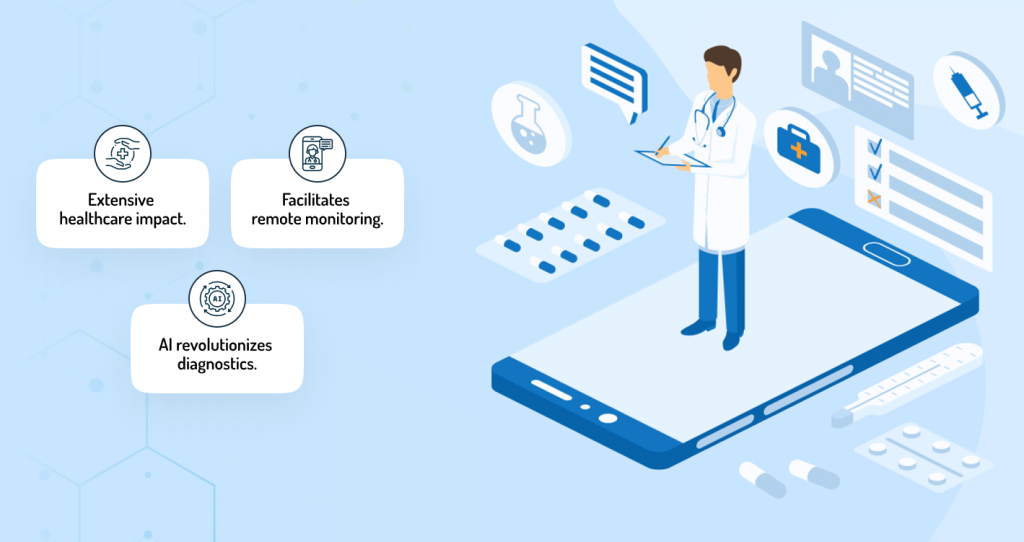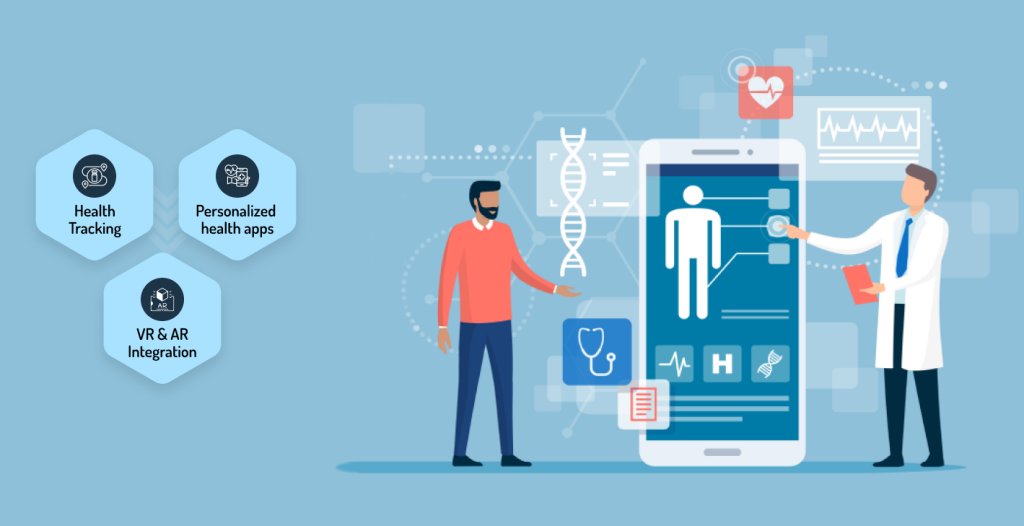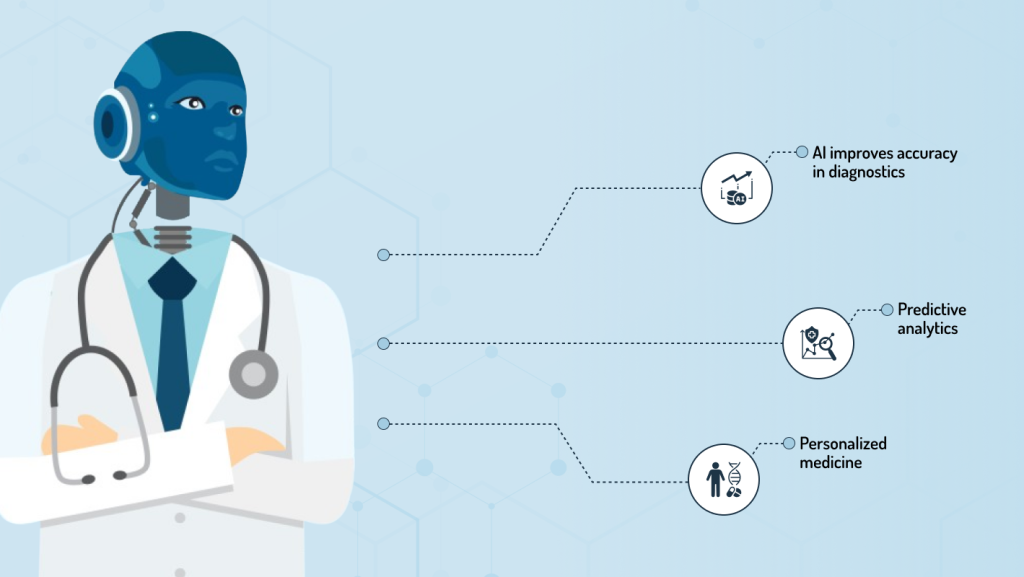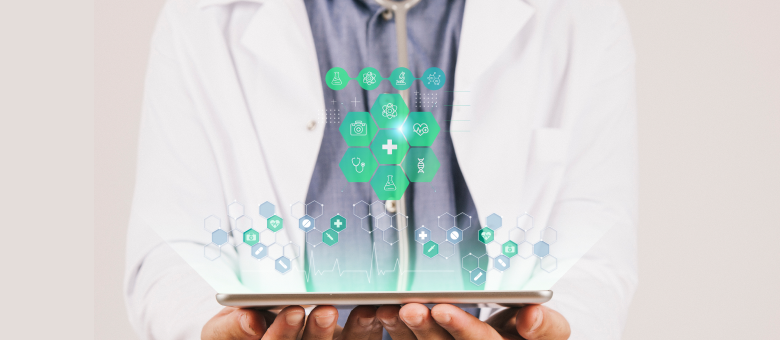As the healthcare industry continues to evolve, the trends in web and mobile HealthTech development, and the integration of web and mobile HealthTech are driving a revolutionary wave of innovation. From AI-powered diagnostics to telemedicine and remote patient monitoring, these technological advancements are reshaping the way healthcare is delivered. With a focus on improving patient outcomes and enhancing accessibility, the advancement of HealthTech is not just a trend, but a necessity in today’s dynamic healthcare landscape.
In this blog, we will explore the cutting-edge trends in web and mobile HealthTech development that are propelling healthcare innovation forward. We’ll explore how web and mobile HealthTech solutions are streamlining processes, empowering patients, and transforming the traditional healthcare model. From wearables that track vital signs to virtual healthcare platforms, the impact of these technologies is profound.
Join us as we deep dive into the rapidly evolving world of healthcare technology, where innovation knows no bounds, and the possibilities are as limitless as the potential to improve lives.
Understanding Healthcare Innovation in Web and Mobile HealthTech
Healthcare innovation in web and mobile HealthTech encompasses a wide range of technological advancements that are designed to improve patient care, enhance the efficiency of healthcare delivery, and promote better health outcomes. By leveraging the power of web and mobile technologies, healthcare providers and technology companies are working together to create innovative solutions that address the complex challenges facing the healthcare industry.
The integration of web and mobile HealthTech is enabling healthcare organizations to streamline their operations, enhance communication between patients and providers, and leverage data-driven insights to deliver personalized care. From electronic health records (EHR) systems to mobile applications that enable remote patient monitoring, the impact of HealthTech on healthcare delivery is transformative. As the healthcare landscape continues to evolve, the role of web and mobile HealthTech will only become more integral in shaping the future of healthcare.
The Impact of Web and Mobile HealthTech on Healthcare

The impact of web and mobile HealthTech on healthcare is far-reaching, influencing every aspect of the industry from patient care and management to administrative processes and research. By harnessing the power of digital technologies, healthcare providers can improve the accessibility of care, enhance the quality of services, and empower patients to take an active role in managing their health.
One of the key impacts of web and mobile HealthTech is the ability to facilitate remote patient monitoring, allowing healthcare providers to track vital signs, medication adherence, and other health metrics outside of traditional clinical settings. This not only improves the efficiency of care delivery but also enables early intervention and personalized treatment plans. Additionally, virtual health platforms and telemedicine services have expanded access to care, particularly for underserved populations and those in remote areas.
The integration of AI and machine learning in HealthTech has also revolutionized diagnostics, enabling more accurate and efficient assessment of medical imaging, predictive analytics, and personalized treatment recommendations. The potential for these technologies to improve patient outcomes and reduce healthcare costs is substantial, making them a cornerstone of healthcare innovation.
Trends in Web and Mobile HealthTech

The landscape of web and mobile HealthTech is continuously evolving, driven by innovations in technology, shifting patient expectations, and the dynamic nature of the healthcare industry. Several key trends are shaping the future of HealthTech, including the widespread adoption of wearable devices for health monitoring, the development of personalized health apps, and the integration of virtual reality and augmented reality in healthcare applications.
Wearable devices, such as smartwatches and fitness trackers, have become increasingly sophisticated, offering features that go beyond basic activity tracking to include continuous monitoring of vital signs, sleep patterns, and even early warning systems for potential health issues. These devices provide valuable data that can be leveraged by healthcare providers to deliver proactive and personalized care, as well as by individuals to take control of their health and wellness.
Personalized health apps are also gaining traction, offering users the ability to track their health metrics, access personalized health recommendations, and connect with healthcare providers for virtual consultations. These apps are not only empowering individuals to take charge of their health but also facilitating better communication and collaboration between patients and their care teams.
The integration of virtual reality (VR) and augmented reality (AR) in healthcare is opening up new frontiers in medical education, surgical training, and patient care. VR simulations are being used to train healthcare professionals in high-risk procedures, while AR applications are enhancing the accuracy of surgical interventions and medical imaging interpretation.
The Role of AI and Machine Learning in HealthTech

AI and machine learning are playing an increasingly significant role in the advancement of web and mobile HealthTech. These technologies have the potential to transform the way healthcare is delivered, from diagnostics and treatment planning to predictive analytics and personalized medicine.
In diagnostics, AI-powered algorithms are improving the accuracy and efficiency of medical imaging interpretation, enabling early detection of diseases and reducing the likelihood of missed diagnoses. Machine learning models trained on large datasets of patient information can identify patterns and correlations that human clinicians may overlook, leading to more precise and timely diagnoses.
Furthermore, AI-driven predictive analytics are being used to identify individuals at high risk of certain health conditions, allowing for early intervention and targeted preventive measures. By analyzing diverse data sources, including genetic information, lifestyle factors, and environmental influences, AI can generate personalized risk assessments and recommendations for disease prevention and management.
In personalized medicine, AI and machine learning are enabling the development of tailored treatment plans based on individual patient characteristics, genetic profiles, and response patterns. This personalized approach to healthcare not only improves treatment outcomes but also minimizes the risk of adverse reactions and unnecessary interventions.
Data Security and Privacy in Web and Mobile HealthTech
As the use of web and mobile HealthTech continues to expand, ensuring the security and privacy of patient data is paramount. The collection, storage, and transmission of health-related information present unique challenges and vulnerabilities that must be addressed to maintain patient trust and comply with regulatory requirements.
Data security in HealthTech involves implementing robust encryption protocols, access controls, and secure storage practices to safeguard sensitive patient information from unauthorized access or breaches. Additionally, healthcare organizations must establish clear policies and procedures for data governance, including data retention, access management, and breach response protocols.
Privacy considerations are equally important, as the use of web and mobile HealthTech involves the collection of personal health data that is protected by privacy regulations such as the Health Insurance Portability and Accountability Act (HIPAA) in the United States. Healthcare providers and technology companies must ensure that patient consent is obtained for the collection and use of their health data and that appropriate measures are in place to protect the confidentiality and integrity of this information.
Moreover, as the global regulatory landscape for data protection evolves, healthcare organizations must stay abreast of emerging requirements and best practices to maintain compliance and mitigate the risk of data-related incidents.
Advantages of Telemedicine and Virtual HealthTech
Telemedicine and virtual HealthTech offer numerous advantages that are transforming the delivery of healthcare services and improving patient access to care. These technologies are breaking down geographical barriers, enhancing convenience, and enabling more efficient use of healthcare resources.
One of the primary advantages of telemedicine is the ability to connect patients with healthcare providers remotely, reducing the need for in-person visits and overcoming geographical limitations. This is particularly beneficial for individuals in rural or underserved areas, as well as for patients with mobility challenges or chronic conditions that require frequent monitoring.
Telemedicine also improves the efficiency of healthcare delivery by reducing wait times, minimizing the need for unnecessary emergency room visits, and enabling more timely access to specialist consultations. This not only benefits patients but also alleviates the strain on healthcare facilities and staff, particularly in times of high demand or public health emergencies.
Virtual health platforms, including mobile apps and web-based portals, offer patients the convenience of accessing healthcare services and information from the comfort of their own homes. From scheduling appointments and receiving test results to engaging in virtual consultations and accessing educational resources, virtual health technologies empower individuals to take control of their health and well-being.
Challenges and Opportunities in Implementing Web and Mobile HealthTech
While the potential benefits of web and mobile HealthTech are substantial, some challenges and opportunities must be considered in the implementation and adoption of these technologies.
One of the primary challenges is ensuring the interoperability of HealthTech systems with existing healthcare infrastructure and electronic health record (EHR) platforms. Seamless integration and data exchange between different systems is essential for the efficient and effective use of HealthTech solutions and for providing a comprehensive view of patient health information across care settings.
Another challenge is the need to address disparities in access to technology and digital literacy, particularly among vulnerable populations and older adults. Efforts to bridge the digital divide and promote health equity through the use of web and mobile HealthTech are essential for ensuring that all individuals have the opportunity to benefit from these innovations.
Moreover, the rapid pace of technological advancement in the HealthTech space presents opportunities for entrepreneurs, investors, and healthcare organizations to collaborate on the development and commercialization of innovative solutions. Startups and established companies alike are exploring new frontiers in HealthTech, from wearable devices and remote monitoring tools to AI-driven diagnostics and virtual care platforms.
Investing in web and mobile HealthTech startups not only offers the potential for financial returns but also contributes to the advancement of healthcare innovation and the improvement of patient care. By supporting the development of novel technologies and solutions, investors and stakeholders can play a crucial role in shaping the future of healthcare delivery and wellness management.
Investing in Web and Mobile HealthTech Startups
The future of web and mobile HealthTech holds tremendous promise for transforming the healthcare landscape and addressing the evolving needs of patients, providers, and healthcare organizations. As technology continues to advance and innovations emerge, the potential for HealthTech to revolutionize healthcare delivery and improve patient outcomes is boundless.
In the years ahead, we can expect to see continued growth in the adoption of wearable devices for health monitoring, with enhanced capabilities for tracking a broader range of health metrics and providing actionable insights for users and healthcare providers. The integration of AI and machine learning in HealthTech will also become more sophisticated, enabling more accurate diagnostics, personalized treatment recommendations, and predictive analytics for population health management.
Furthermore, the expansion of telemedicine and virtual health platforms will enable a more seamless and comprehensive delivery of care, integrating virtual consultations, remote monitoring, and digital health tools into the standard practice of medicine. These technologies will not only improve access to care but also promote patient engagement and empowerment, leading to better health outcomes and a more patient-centred approach to healthcare.
The future of web and mobile HealthTech also holds potential for breakthroughs in areas such as genomics, precision medicine, and bioinformatics, as technology continues to enable a deeper understanding of human health and disease. With ongoing advancements in data analytics, cloud computing, and interoperability standards, the possibilities for leveraging technology to drive healthcare innovation are limitless.
Future of Web and Mobile HealthTech
In conclusion, the integration of web and mobile HealthTech is driving a revolutionary wave of innovation in the healthcare industry, with profound implications for patient care, provider efficiency, and the overall delivery of healthcare services. From AI-powered diagnostics and wearable health monitoring devices to telemedicine and virtual health platforms, the impact of these technologies is reshaping the way healthcare is delivered and experienced.
As we continue to explore the cutting-edge trends in web and mobile HealthTech, it is clear that the potential for innovation knows no bounds, and the possibilities to improve lives through technology are limitless. By embracing the opportunities and addressing the challenges of implementing HealthTech, we can pave the way for a future where healthcare is more accessible, personalized, and impactful than ever before.
The ongoing evolution of web and mobile HealthTech holds the promise of a healthcare landscape that is more interconnected, efficient, and responsive to the needs of individuals and communities. As we look to the future, the opportunities for driving healthcare innovation through technology are boundless, and the potential to transform lives and improve health outcomes is as vast as the capabilities of HealthTech itself.
In closing, let us embrace the advancements in web and mobile HealthTech as a catalyst for positive change in healthcare, propelled by innovation and driven by the shared goal of enhancing the well-being of individuals and populations. The journey towards a future of healthcare that is powered by technology is underway, and the possibilities for progress and impact are as limitless as the potential of HealthTech to shape the future of healthcare.
Conclusion
The future of web and mobile HealthTech is incredibly promising, with a wide range of transformative trends in web and mobile HealthTech development that are revolutionizing the healthcare landscape. One of the most significant trends is the widespread adoption of telemedicine, which has proven to be a game-changer in providing remote care to patients. The convenience and accessibility of telemedicine have expanded healthcare reach to rural and underserved areas, enabling patients to connect with healthcare providers virtually. This shift has not only improved patient access to care but has also enhanced healthcare efficiency and reduced unnecessary hospital visits.
Another compelling trend is the integration of AI and machine learning in healthcare diagnostics. AI-powered platforms are capable of analyzing vast amounts of medical data with unprecedented speed and accuracy, leading to more precise diagnoses and personalized treatment plans. This innovative approach has the potential to revolutionize disease detection and management, ultimately improving patient outcomes and reducing healthcare costs. Additionally, AI-driven predictive analytics are empowering healthcare providers to identify at-risk patients and intervene proactively, leading to preventive care strategies that can significantly impact population health.
The rise of wearable HealthTech devices is also shaping the future of healthcare, allowing individuals to monitor their health in real-time and take a proactive approach to wellness. From smartwatches that track heart rate and activity levels to continuous glucose monitoring systems for diabetics, wearable devices are empowering individuals to actively engage in their health management. These devices not only provide valuable health data to users but also enable healthcare providers to access real-time patient information, leading to more informed decision-making and personalized care plans.
The convergence of web and mobile HealthTech with virtual reality (VR) and augmented reality (AR) is opening up new frontiers in healthcare delivery and medical training. VR and AR technologies are being utilized for patient education, surgical simulations, and mental health interventions, offering immersive experiences that enhance learning and therapeutic outcomes. These advancements are not only improving patient engagement and satisfaction but also revolutionizing medical education and training, ultimately elevating the standard of care across the healthcare industry.
In conclusion, the future of web and mobile HealthTech is characterized by unprecedented innovation and transformative potential. As these trends continue to evolve, they hold the promise of enhancing patient care, improving healthcare accessibility, and driving positive outcomes across the entire healthcare ecosystem. Embracing these technological advancements is essential for propelling the healthcare industry into a new era of innovation and effectiveness.
Choose Aipxperts As Your HealthTech Development Partner
As the healthcare industry continues to evolve, so does the demand for innovative HealthTech solutions. With a focus on the latest trends in web and mobile HealthTech development, Aipxperts is uniquely positioned to help healthcare providers and organizations deliver exceptional patient care.
Aipxperts is committed to staying at the forefront of HealthTech innovation, leveraging cutting-edge technologies like artificial intelligence, machine learning, and augmented reality to create solutions that are both effective and user-friendly. Whether you’re looking to develop a telemedicine platform, a remote patient monitoring system, or a personalized health management app, Aipxperts has the expertise and experience to bring your vision to life.
In addition to our technical expertise, Aipxperts also offers a deep understanding of the trends in web and mobile HealthTech development and its unique challenges. We work closely with our clients to understand their specific needs and goals, and we develop solutions that are tailored to their requirements. We also provide ongoing support and maintenance to ensure that your HealthTech solutions continue to meet your evolving needs.
Check out our portfolio to take a glimpse of our work!
Trends in web and mobile HealthTech development | Partner with Aipxperts to develop your HealthTech platform. Contact us for project estimates and enjoy a 15-day risk-free trial period.











